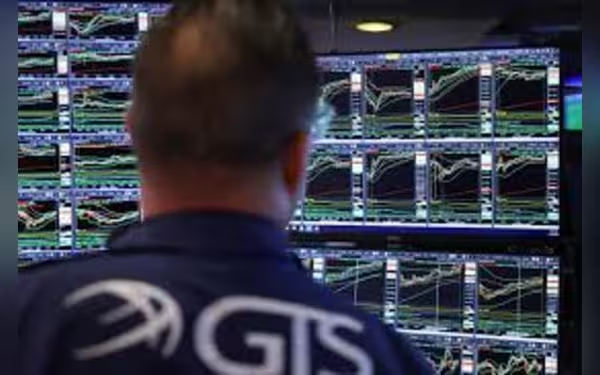Saturday, November 16, 2024 07:41 PM
Wall Street Declines as Investors Await Key Economic Data
- Wall Street dips as investors take profits.
- Focus shifts to upcoming inflation data.
- Tesla stock drops after significant gains.
 Image Credits: thefrontierpost
Image Credits: thefrontierpostWall Street dips as investors take profits, focusing on upcoming inflation data and market volatility.
Wall Street experienced a downturn on Tuesday as investors decided to take profits after a series of gains following the recent elections. The focus has now shifted to important economic data, particularly inflation figures, which are expected later this week. This shift in attention comes as some stocks that were anticipated to thrive under President Donald Trump began to lose their momentum.
One notable example is Tesla, the electric vehicle manufacturer, which saw its stock price drop by 3.4% after soaring nearly 40% since November 5. Other sectors, including consumer discretionary, materials, and utilities, also faced declines of more than 1%. The small-cap Russell 2000 index fell by 1.3%, following a three-year high it reached on Monday. Additionally, shares of Trump Media & Technology Group fell by 8.3%, while some cryptocurrency stocks eased as Bitcoin slipped after its record-breaking performance.
The three major indexes had previously rallied to record highs since the election, fueled by investor optimism regarding President-elect Trump’s proposed tax cuts and the potential for less stringent regulatory policies. Quincy Krosby, a chief global strategist for LPL Financial, noted, "Given how every single day since the election the market has done so well, it’s not unexpected for us to see a pullback this week." This sentiment reflects a common understanding among investors that markets can be volatile, especially after significant gains.
The Dow Jones Industrial Average fell by 209.48 points, or 0.47%, closing at 44,083.65. The S&P 500 lost 16.33 points, or 0.27%, ending at 5,985.02, while the Nasdaq Composite decreased by 29.03 points, or 0.15%, to close at 19,269.73. As the week progresses, all eyes will be on Wednesday’s consumer price inflation data, followed by producer prices and retail sales data. These figures will likely influence the U.S. Federal Reserve’s policy decisions moving forward.
Market expectations for interest rate reductions have already been tempered due to strong economic data and the potential inflationary effects of some of Trump’s policies. Krosby remarked, "There’s heavy concentration on the inflation data … to determine whether the Fed may pause rate cuts at their December meeting." Currently, traders are pricing in a 65% chance of a 25-basis point interest rate cut at the Fed’s upcoming meeting.
Richmond Fed President Thomas Barkin indicated that the central bank is prepared to respond if inflation pressures increase or if the job market shows signs of weakness. Fed officials Neel Kashkari and Patrick Harker are also expected to address the market later in the day.
The blue-chip Dow was particularly affected by declines in healthcare and financial stocks, including UnitedHealth and Goldman Sachs. Home improvement retailer Home Depot saw a slight drop of 0.5%, despite predicting a smaller decline in annual same-store sales. In contrast, biotech firm Novavax experienced a significant drop of 3.7% after revising its annual revenue forecast downward due to lower-than-expected sales of its COVID-19 vaccine.
On a brighter note, Honeywell reached a record high, rising by 2.6% after activist investor Elliott Investment disclosed that it has acquired a stake worth over $5 billion in the industrial conglomerate. Overall, declining issues outnumbered advancers on the NYSE by a ratio of 3.5-to-1 and 2.27-to-1 on the Nasdaq. The S&P 500 recorded 43 new 52-week highs and 13 new lows, while the Nasdaq Composite noted 167 new highs and 93 new lows.
While Wall Street may have dipped on Tuesday, the underlying economic indicators and upcoming data releases will play a crucial role in shaping market sentiment in the days to come. Investors should remain vigilant and informed, as the financial landscape continues to evolve in response to both domestic and global economic factors.













